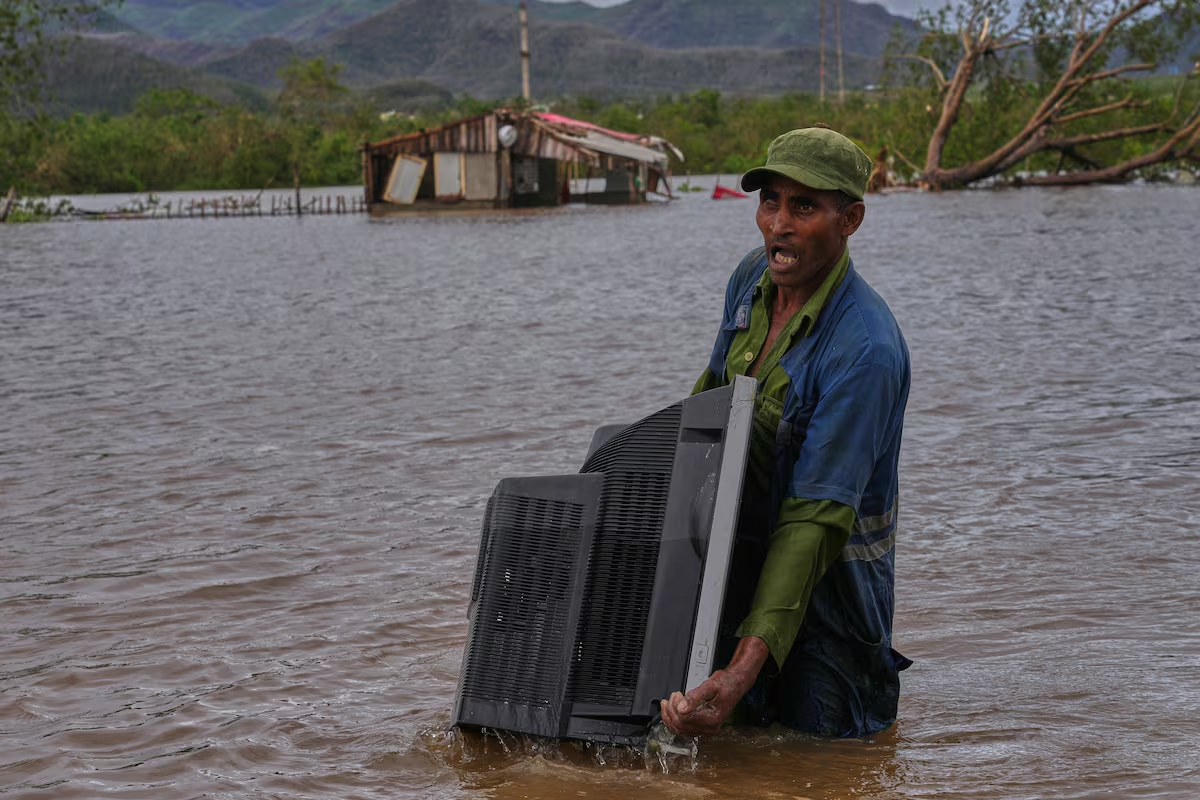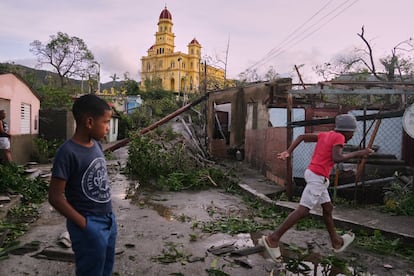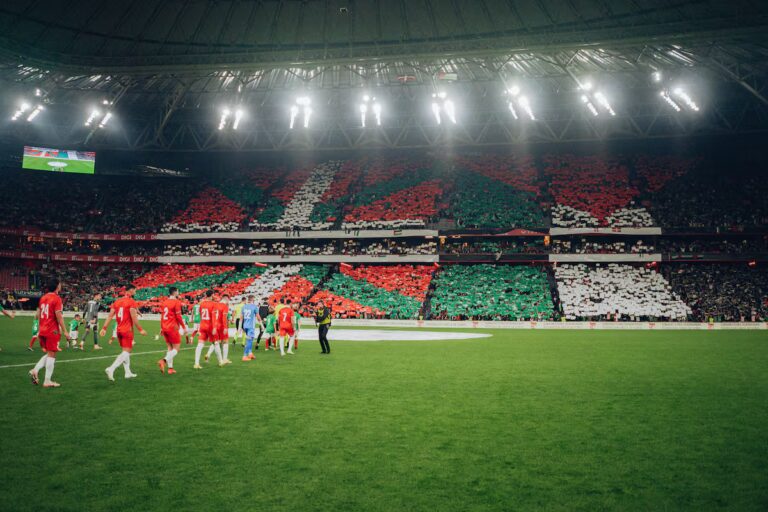
Mingito He didn’t know he was famous until people stopped him on the street. They wanted to make sure he was the guy who was in the middle of the river flooding after the hurricane passed. melissa Through Cuba, he grabbed the television as one would a drowning family, breathing life into electronic appliances. An Associated Press photographer saw it, pressed the shutter, and that moment became a portrait of the Cuban disaster. A man with crooked eyes and an olive green military beret was rescuing the unsalvageable and holding under his arm those he knew were destined to die.
While communication with eastern Cuba is difficult, Mingitoor Duany Calzado Despaigne, 40, and his television were, for a while, pretty much the only information we had about the devastation the hurricane was wreaking on this country. Mingito It spread online, and his face reached places he didn’t know, far from the small town outside Santiago de Cuba where he lives, and he was seen by people who would never have met him under any other circumstances.
A few days later, activist Yasser Sosa Tamayo visited him and we heard from him: Mingito He lived in a house with wooden walls and a textile roof, but the wind blew it away. He raised animals that disappeared in the hurricane. There was a bed, a fan, and some containers that I can’t find now. He has devoted almost his entire life to making charcoal, a job he did to raise 35,000 pesos (about $77) to buy a Panda TV. The moment he found out his house was flooded, there was nothing he could do. “Television is life,” he said. When he got home from work, he would sit down and watch whatever show was on the air. All the fun was on that screen. The artifact did not survive. melissabut Mingito I want to keep that. “How can I let him go so I can remember him?”
So that portraits like this can exist, Mingito He had to be a man of too few things. Hurricanes in Cuba always hit the people with the least wealth, or almost nothing, the hardest. The hurricane eventually exposes the pit of misery.
before passing through melissaMy father and I were on a small balcony of a four-story building. southern Originally from Miami. There was an atmosphere that seemed to erase everything, even memories. “Remember when the cyclone came and we slept on the roof?” asked my father, who had been away from home for almost three years. As a matter of fact, I wanted to know if he remembered how we used to be.
That image is often recalled, especially when immigrants are lonely. Under the clear and quiet sky, we were relieved from the heat of days without light. We lived in a coastal town west of Havana that was rocked by cyclones and hurricanes. It was special then and it’s special now. The voice of José Rubiera, Cuba’s most popular meteorologist, crept into people’s living rooms in the light of day, and people did exactly what Rubiera told them to do. They propped up roofs and windows, stored food, and filled containers with water from fighting previous cyclones or preemptively removing from the hurricane what could not be salvaged later.
The cyclone day was long and we waited so long that by the time the cyclone finally passed over us or from within, we arrived tired or asleep. There was no greater joy in my childhood memories. None of my neighborhood friends went to school, the domino tables were set up early, and the house was full of neighbors. For me it was a party, but not really related to the people who were going to lose everything the next day.
Orlando, a washing machine repairman, or Esperanza and Tata, a couple of nearly 80-year-old coal workers, moved into our home. At the time, I didn’t realize how lucky we were. We didn’t have any luxuries, but we did have a house with concrete walls and a roof that would stay in place, hardly blown away by any wind. For us Cubans, we have been trained to think of ourselves as residents of a country without social classes, but a cyclone divided us and our immediate status was marked by a consistent ceiling, or rechargeable lamps to illuminate power outages, and even water tanks to bathe, flush the toilet, and cook at the same time.
The morning after the cyclone, almost always wet, dirty and gray, it was the moment my father and I had been looking forward to the most. We held hands and went around town doing roll call and I was amazed. A fallen tamarind tree. A pig that Pupo managed to save in the toilet. The village where my father worked is now either roofless or flooded. Yamilet’s house whose windows fell down due to the wind. And the whole of the North Sea was in the sea of my little friend Fuentes.
After each loss, a caravan of haggard faces appeared, people upset that the sea had eaten them, angry that they couldn’t turn on the TV, and resentful of wet mattresses that took days to dry. The city became an inhospitable place, and cyclones ripped off limbs one after another. At the time, there was nothing to replace the computer center door. A blown roof tile from an elementary school. More and more polyclinics are being destroyed. In some homes, the cyclone destroyed the kitchen, bathroom and living room in stages, forcing entire families to sleep, eat and bathe in the rooms that were once their homes. As the days pass, we get used to living with less.
Cyclones and hurricanes continued to arrive. The window that the hurricane didn’t take away flora (1960), Kate (1979) took it. Streets that were not swept up by the hurricane michelle (2001), or the walls he didn’t tear down. charlie (2004), did Wilma (2005). And to the devastation left behind by the previous people, Ike (2008) or gustav (2008). And if accumulated poverty is not enough, hurricanes Irma (2017) or ian (2022) added to the misery. Accumulated damage no longer appeared to be due to a single hurricane, but to more consistent, long-term, and powerful hurricanes.
Few people recovered from the hurricane. As the days passed, always with delay, and to the despair of the people, water pipes began to appear, repairing some transformers and distributing tiles to the roofs that would collapse in the next cyclone. He never went to our people, but sometimes in some of the most devastated places Fidel Castro appeared in person, arm around the shoulders of the victims, holding children awake late at night, repeating in many versions that in Cuba the cyclone was not a human tragedy, but a battle to be fought together. Or more importantly, they were evidence of a people’s moral strength. Castro guaranteed future speeches, and now that Castro is dead melissasaid Lis Cuesta, wife of ruler Miguel Diaz-Canel, “No hurricane is stronger than the will of this people.”
But the town was exhausted, as if the biggest hurricane system had not yet broken up. From the day she died, the old lady Norris with a noble smile did not begin to cook with firewood or sleep on a “little cloth” without even a mattress. melissa. The Toothless Farmer’s floor was always dirt, so there is mud on the ground. Many rescued families have not had a proper place to live for a long time. The United Nations claims that more than 3.5 million people were affected by the recent hurricanes, but in reality, many more survived the storm and made it through the year.
The international community and asylum seekers are mobilizing to send food, clothing and medicine. “Everything is needed in Cuba,” they say. The ship will arrive from Venezuela, the United Nations will collect millions of dollars, other governments will participate, and US Secretary of State Marco Rubio will be willing to help, but there will be no “intermediary”, meaning the Havana government will not participate in the distribution. There are those who agree with the Cuban-American, after many times Castroism has resulted in the privatization of the people’s property. Some people criticize the aid as “handouts.” Some hope that, at least this time, Cubans will stop worrying less about politics and more about children with wind-blown clothes or mothers without milk.

The balance of a hurricane is determined by the poverty it creates, not what it leaves behind at the time. Those who have lost what little they had will be much more humble than they were yesterday. For hungry families, a bag of donations is enough to feed a hungry family that day’s dinner. The light does not come, because in fact it went out a while ago. As almost always, there is very little water in the neighborhood. The storm had been around for a long time so the country didn’t collapse again.



